Serving 439 students in grades 6-8, Thoreau Demonstration Academy ranks in the bottom 50% of all schools in Oklahoma for overall test scores (math proficiency is bottom 50%, and reading proficiency is bottom 50%).
The percentage of students achieving proficiency in math is 9% (which is lower than the Oklahoma state average of 25%). The percentage of students achieving proficiency in reading/language arts is 13% (which is lower than the Oklahoma state average of 27%).
The student:teacher ratio of 19:1 is higher than the Oklahoma state level of 15:1.
Minority enrollment is 80% of the student body (majority Hispanic and Black), which is higher than the Oklahoma state average of 56% (majority Hispanic and American Indian).
Quick Stats (2025)
- Grades: 6-8
- Enrollment: 439 students
- Student:Teacher Ratio: 19:1
- Minority Enrollment: 80%
- Overall Testing Rank: Bottom 50% in OK
- Math Proficiency: 9% (Btm 50%)
- Reading Proficiency: 13% (Btm 50%)
- Science Proficiency: 25-29% (Btm 50%)
- Source: National Center for Education Statistics (NCES), OK Dept. of Education
Top Rankings
Thoreau Demonstration Academy ranks among the top 20% of public schools in Oklahoma for:
Category
Attribute
Diversity
School Overview
Thoreau Demonstration Academy's student population of 439 students has declined by 29% over five school years.
The teacher population of 23 teachers has declined by 23% over five school years.
Grades Offered
Grades 6-8
Total Students
439 students
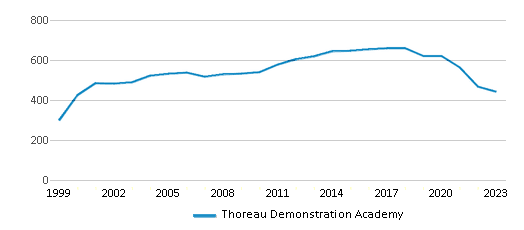
Gender %
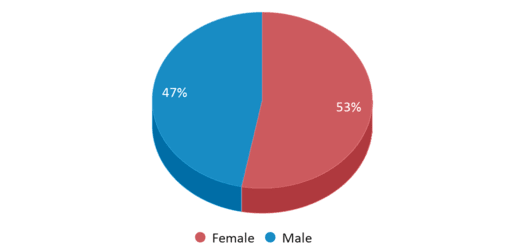
Total Classroom Teachers
23 teachers
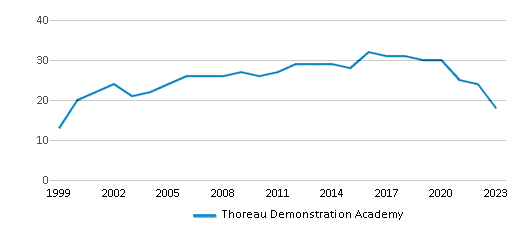
Students by Grade
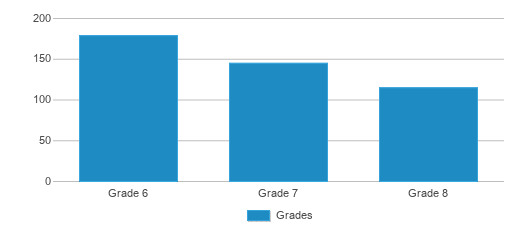
School Rankings
Thoreau Demonstration Academy ranks within the bottom 50% of all 1,680 schools in Oklahoma (based off of combined math and reading proficiency testing data).
The diversity score of Thoreau Demonstration Academy is 0.76, which is more than the diversity score at state average of 0.73. The school's diversity has stayed relatively flat over five school years.
Overall Testing Rank
#1501 out of 1680 schools
(Bottom 50%)
(Bottom 50%)
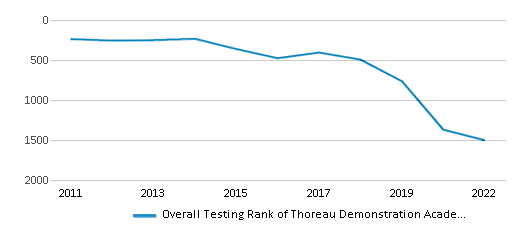
Math Test Scores (% Proficient)
9%
25%
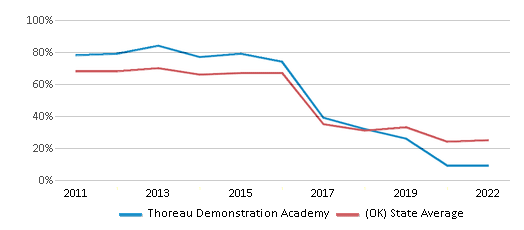
Reading/Language Arts Test Scores (% Proficient)
13%
27%
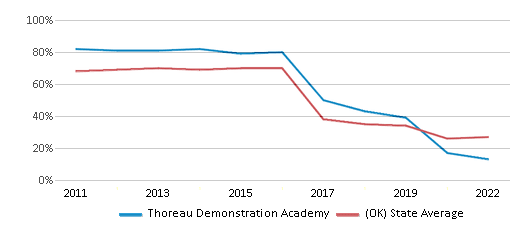
Science Test Scores (% Proficient)
25-29%
31%
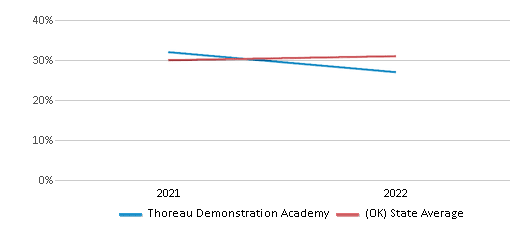
Student : Teacher Ratio
19:1
15:1
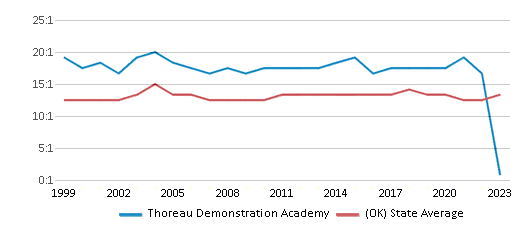
American Indian
5%
11%
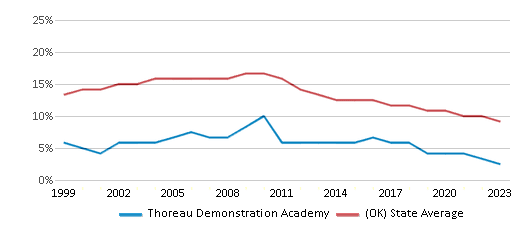
Asian
1%
2%
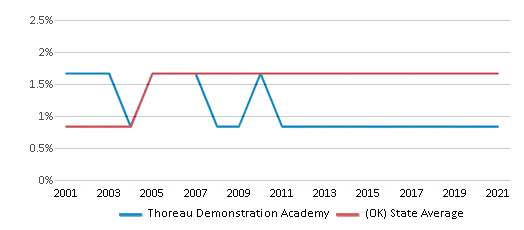
Hispanic
32%
20%
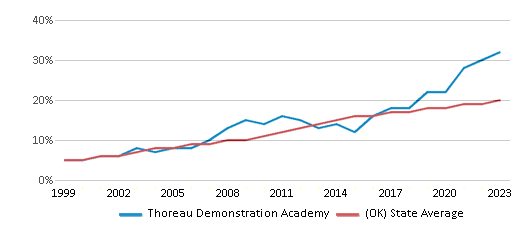
Black
30%
8%
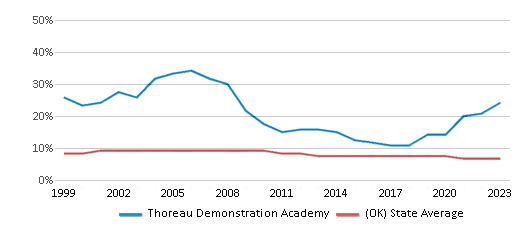
White
20%
44%
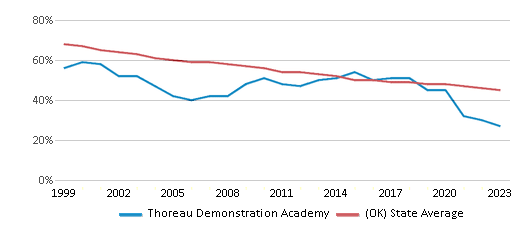
Hawaiian
n/a
1%
Two or more races
12%
14%
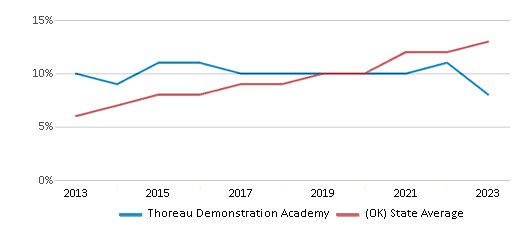
All Ethnic Groups
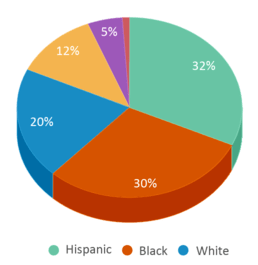
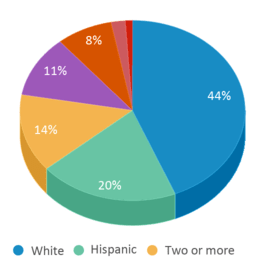
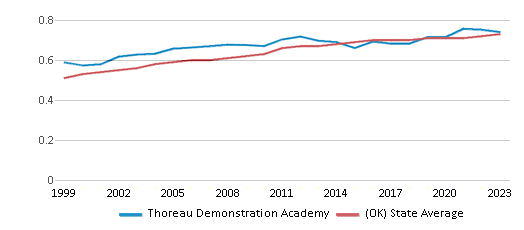
Participates in the National School Lunch Program (NSLP)
Yes
Eligible for Free Lunch
70%
48%
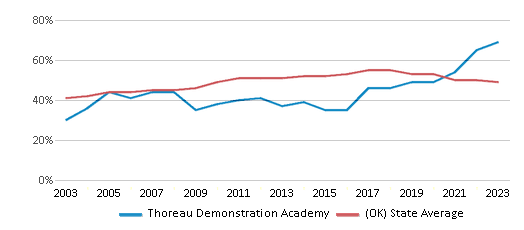
Eligible for Reduced Lunch
19%
7%
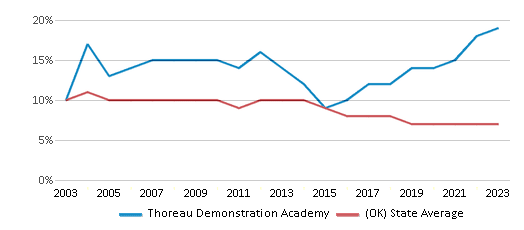
School Statewide Testing
School District Name
Source: National Center for Education Statistics (NCES), OK Dept. of Education
Profile last updated: 02/09/2025
Frequently Asked Questions
What is Thoreau Demonstration Academy's ranking?
Thoreau Demonstration Academy is ranked #1501 out of 1,680 schools, which ranks it among the bottom 50% of public schools in Oklahoma.
What schools are Thoreau Demonstration Academy often compared to?
Thoreau Demonstration Academyis often viewed alongside schools like Edison Preparatory Middle School, Carver Middle School by visitors of our site.
What percent of students have achieved state testing proficiency in math and reading?
9% of students have achieved math proficiency (compared to the 25% OK state average), while 13% of students have achieved reading proficiency (compared to the 27% OK state average).
How many students attend Thoreau Demonstration Academy?
439 students attend Thoreau Demonstration Academy.
What is the racial composition of the student body?
32% of Thoreau Demonstration Academy students are Hispanic, 30% of students are Black, 20% of students are White, 12% of students are Two or more races, 5% of students are American Indian, and 1% of students are Asian.
What is the student:teacher ratio of Thoreau Demonstration Academy?
Thoreau Demonstration Academy has a student ration of 19:1, which is higher than the Oklahoma state average of 15:1.
What grades does Thoreau Demonstration Academy offer ?
Thoreau Demonstration Academy offers enrollment in grades 6-8
What school district is Thoreau Demonstration Academy part of?
Thoreau Demonstration Academy is part of Tulsa School District.
School Reviews
2 4/26/2021
I loved Thoreau until my son entered into his Spanish class and 9/10 was not let into this class online. My husband and I have reached out multiple times throughout the semester to find out why he's not being let into this vital class. We've emailed, called, left voicemails, we've tried everything except for showing up at the school to speak with someone in person about this situation. My son studies from home due to myself having an autoimmune condition that keeps us all home, so I won't become ill. All I need is for someone at Thoreau to contact me and his father to let us know why he's not being allowed into the classroom. Please and thank you.
Review Thoreau Demonstration Academy. Reviews should be a few sentences in length. Please include any comments on:
- Quality of academic programs, teachers, and facilities
- Availability of music, art, sports and other extracurricular activities
Recent Articles

What Is A Charter School?
Explore the world of charter schools in this comprehensive guide. Learn about their history, how they operate, and the pros and cons of this educational innovation. Discover key facts about charter schools, including admission policies, demographics, and funding, as well as what to look for when considering a charter school for your child.

10 Reasons Why High School Sports Benefit Students
Discover the 10 compelling reasons why high school sports are beneficial for students. This comprehensive article explores how athletics enhance academic performance, foster personal growth, and develop crucial life skills. From improved fitness and time management to leadership development and community representation, learn why participating in high school sports can be a game-changer for students' overall success and well-being.

February 05, 2025
Understanding the U.S. Department of Education: Structure, Impact, and EvolutionWe explore how the Department of Education shapes American education, from its cabinet-level leadership to its impact on millions of students, written for general audiences seeking clarity on this vital institution.









